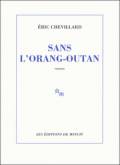Auteurs contemporains
Discours critique sur les œuvres de littérature contemporaine
Outils pour utilisateurs
Outils du site
Sans l'orang-outan
 Éric Chevillard, Sans l’orang-outang, Paris, Éditions de Minuit, 192 p.
Éric Chevillard, Sans l’orang-outang, Paris, Éditions de Minuit, 192 p.
«Nous ne soupçonnions pas l’importance de l’orang-outan dans l’organisation générale du monde ni que tout tenait ensemble grâce à lui, à son action discrète mais décisive. C’était lui, le subtil rouage. Il a suffi qu’il disparaisse pour que tout flanche. Comment vivre sans lui ? Essayons. » (Quatrième de couverture)
Documentation critique
RAVINDRANATHAN, Thangam, « Unequal Metrics: Animals Passing in La Fontaine, Poe, and Chevillard », Differences: A Journal of Feminist Cultural Studies, vol. 24, n° 3 (automne 2013), p. 1-35. +++ Article de revue
### Résumé
This essay considers through a string of three fables—a classic wolf trap in La Fontaine, Poe’s story “The Murders in the Rue Morgue,” and contemporary French novelist Eric Chevillard’s Sans l’orang-outan—the animal as the paradoxical, derealized figure of a passing. Drawing on Jacques Derrida, Thomas Keenan, and Maurice Blanchot, among others, the essay understands this passing as a duplicitous logic (that is, one involving a fold, a lag, and a return that precedes a turn) that has the animal standing on certain telling thresholds vis-à-vis the whole, responsible (human) subject. Whether naively eavesdropping at the door, criminally entering an apartment, or tragically exiting the world, the animal is somehow always not yet or no longer in the place of accountable agency that a narrative might bear. This logic can in turn be understood as a function of un-equality, for the animal marks a point at which language or narrative is unequal to itself. The singular, constitutive thresholds or folds of these fables in turn betray something of how language or narrative might work, in what nameless bodies—and even bodiless names—it secretly trades.
ALLAMAND, Carole, « Du sommaire au moindre : l’humanité en fuite », Contemporary French and Francophone Studies, vol. 16, n° 4 (septembre 2012), p. 517-524. +++ Article de revue
### Résumé
L’idée ne viendrait à aucun lecteur sérieux d’imputer le destin de Meursault à la disparition du chien de Salamano, ou à celle de sa levrette la fin tragique d’Emma Bovary. Et pourtant tout se passe comme si quelque chose s’échappait par ce trou du texte, quelque chose de l’ordre paradoxal de l’humanité, sur laquelle on finit par tirer à bout portant ou qui disparaît dans les convulsions de l’arsenic. Pareille faille n’est d’ailleurs pas toujours si discrète. On pense au chat de Simenon, emportant avec lui jusqu’à la dernière goutte de civilité du ménage Bouin, y compris ce qui nous séparerait de la bête : la parole. Mon article interroge cette déperdition d’humanité dans Le Monarque égaré (1989) d’Anne-Marie Garat et Sans l’orang-outan (2007) d’Eric Chevillard, deux romans de la disparition animale dont la parenté est scellée par la synonymie révélatrice de leurs héros-narrateurs : Thomas Sommaire et Albert Moindre. Dans le sillage du papillon perdu, dans la béance laissée par le grand singe roux, l’entomologiste se dissout, le primatologue s’abîme, tous deux accusent le coup d’une diminution, d’une régression radicale où se donne à lire, a contrario, la coextension de l’animal et de l’humain.
BRAND, Philippe, « Moving Targets : French Fiction in the Twenty-First Century », mémoire de maîtrise, Department of French and Italian, University of Colorado, 2006, 190 f. +++ Thèse de doctorat / mémoire de maîtrise
### Résumé
This dissertation examines the return of story in the French novel that begins in the mid-1980s, some decades after the New Novelists called into question the most fundamental elements of the traditional novel. The first chapter focuses on certain hallmarks of literary innovations in the twentieth century, from Marcel Proust’s À la recherche du temps perdu to the novels published by Philippe Sollers and Pierre Guyotat. In the body of the dissertation, i devote one chapter each to five writers - Jean-Philippe Toussaint, Marie Redonnet, Éric Chevillard, Christine Montalbetti, and Xabi Molia - who reconsider the potential of the “critical novel” namely, novels that call into question literary norms and explore new narrative possibilities through innovations of form and content.
In his triptych Faire l’amour (2002), Fuir (2005), and La Vérité sur Marie (2009), Jean-Philippe Toussaint seek to capture what he has described as “a pure literary energy,” combining sheer novelistic pleasure with rigorous formal structures. Marie Redonnet’s novel Diego (2005) builds upon her earlier works, amplifying and developing some of her most distinctive themes, while striking off in a new direction toward a more explicit sense of social and political
engagement. Éric Chevillard exploits what André Gide describes as the “lawlessness” of the novel, expanding its bounds beyond all measure as he deals with the limitations, possibilities and potentialities of language and writing. Parodying a wide variety of literary genres and a staggering number of scientific discourses, Chevillard is beholden to no logic but his own. An accomplished literary theorist, Christine Montalbetti has published critical works on topics such as narrative digression, the status of readers and characters, and the relations between fiction and
reality. Her fiction writing, however, calls our scholarly certainties into question, blurring narratological categories and exploding the boundaries between her fiction and the phenomenal world. Xabi Molia’s Reprise des hostilités (2007) weaves a dense web of fiction and reality as he considers the cultural and literary heritage of the twentieth century, constructing a virtual space within his novel where voices from the past and figures from the present mingle together.
La version PDF de la thèse est disponible pour les membres de communautés universitaires qui ont un abonnement institutionnel auprès de UMI - Proquest. ###
| Sans l'orang-outan (oeuvre) | |
|---|---|
| Titre | Sans l'orang-outan |
| Auteur | Éric Chevillard |
| Parution | 2007 |
| Tri | Sans l'orang-outan |
| Afficher | oui |